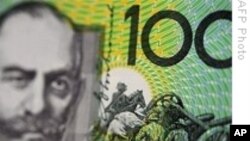The Reserve Bank of Australia has raised its official interest rate by a quarter of a percentage point. The move makes Australia the first developed economy to raise rates since the global financial crisis began. But, other central banks are not likely to follow suit just yet.
The governors of the Reserve Bank of Australia raised its benchmark interest rate to 3.25 percent, Tuesday, up from three percent. They say, with Australia's economic growth on track and the risk of a serious contraction past, it is time to gradually raise rates from their lowest level in 49 years.
The central bank began cutting rates in September 2008, when they stood at 7.25 percent. At the time, the world was rapidly sinking into a crisis, with banks cutting off lending and several international financial institutions on the verge of collapse.
Governments and central banks around the globe stepped in to rescue banks, cut interest rates and create spending packages to stimulate their economies. Most developed and many developing economies slumped into recession.
Adrian Mowat is an Asia market strategist for the investment bank JP Morgan Chase in Hong Kong. He says the situation has changed.
"Globally we have interest rates that were set during a period of a crisis and economies are recovering, particularly in Asia and emerging markets, and it isn't necessary to have interest rates as low as they are ... The patient no longer needs extreme medicine and that's a good sign," said Mowat.
Australia's economy weakened, but did not fall into recession in the past year, because of strong demand from China and other countries for its commodities, such as iron and coal.
Although the global economy is slowly improving, economists and market analysts do not expect interest rates to start rising around the world. For instance, Chinese officials have indicated they will be slow to raise rates, as have other Asian governments.
Mowat says it will be next year before most countries start raising rates, and later for the largest developed economies.
"Our forecast is that the interest rates in the U.S. will be unchanged throughout 2010, same in the euro area, same in Japan," he said.
The United States, Japan and much of Europe all have interest rates near or below one percent.
Usually, central banks raise interest rates to cool overheated economies and head off the risk of price inflation. But Mowat says the RBA's move was not prompted by inflation concerns. It was simply the first step toward returning to more historically normal rates.
News
Australia Becomes First Developed Economy to Raise Interest Rates
update

<!-- IMAGE -->



